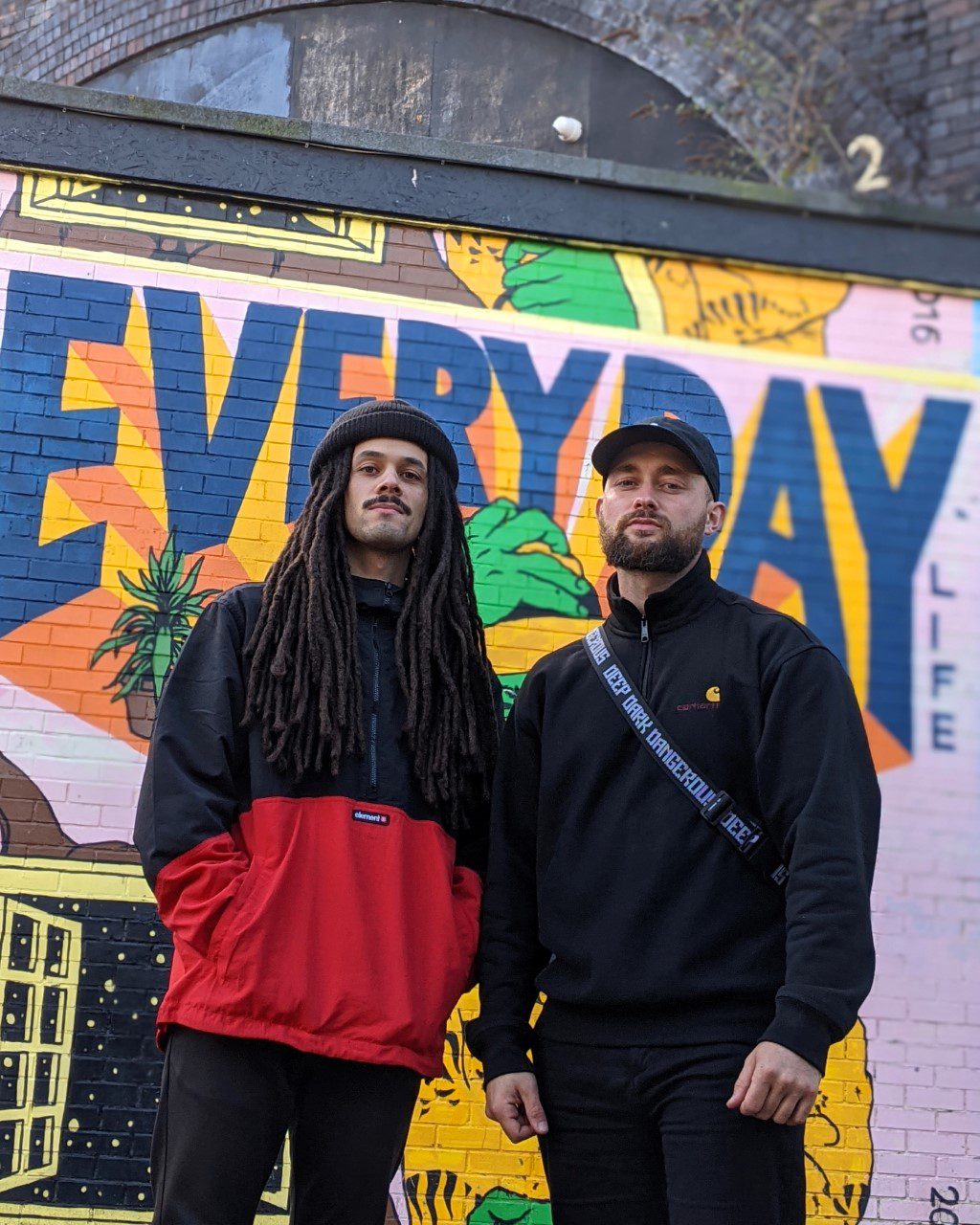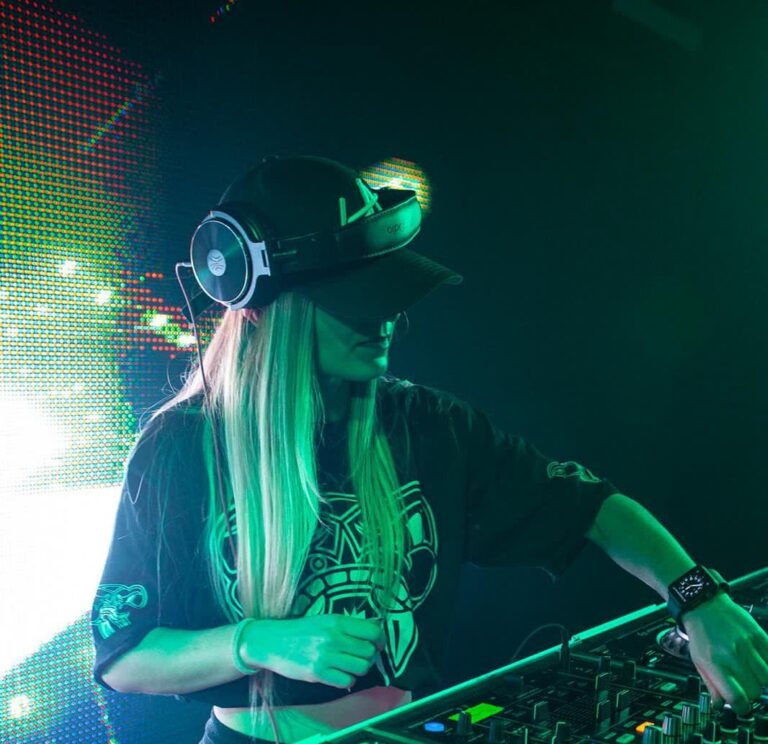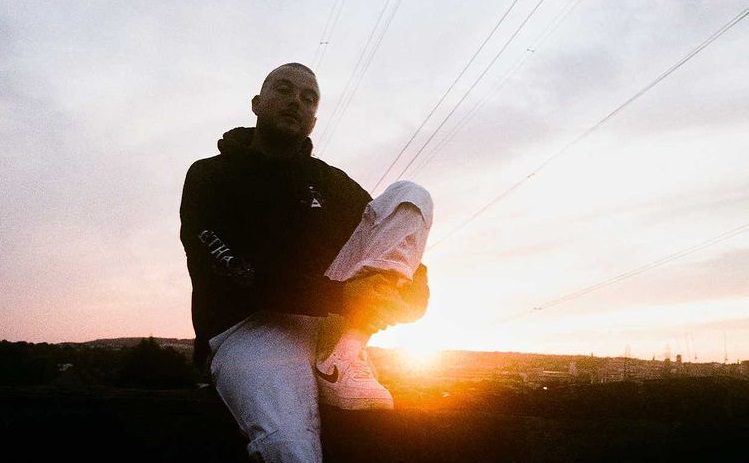In just over two years, Cuttah and C-BO, better known as the boys behind the renowned Deep Tempo podcast, have gone from dubstep’s biggest fans to two of the genre’s most respected tastemakers.
A shared appreciation for the deeper end of the spectrum that has been polished over years of digging, the pair (real names Todd and Charlie) credit an inspirational trip to the bass music haven Outlook Festival in 2017 as the kickstart for their involvement in the scene.
However, it wasn’t until two years and hundreds of hours of reactionary dubstep-related chat down their local pub later that the boys decided to take the plunge and start the podcast.
After a rocky beginning not helped by having to record the podcast from opposite ends of the world as Charlie travelled Asia, the podcast quickly took form into a go-to spot for all dubstep fans to find the best new music from the heads as well as the up-and-comers.
Two years on, the two are referred to by many in the scene as ‘the guardians of the dubs;’ a name the pair fondly cherish. Whether showcasing the latest unreleased weapon from the likes of ENiGMA Dubz, Coki and Mrshl to finding the next big thing from Japan or America, the podcast’s ability to celebrate and push dubstep to a wider audience is second to none.
Deep Tempo received acclaim from the scene in 2020 by winning the Best Show award at the DUPLOC Awards, a testament to the pair’s infectious passion, entertaining personalities and stellar knowledge of all things sitting around the 140-bpm mark.
The coming months look busy for the duo, as they prepare for a busy schedule that will see them perform across the UK and at Outlook. Before they start all that, however, we gave them a call to hear about two years of Deep Tempo.
Lock in for a chat that covers what it takes to start a podcast, their thoughts on the dubstep scene, and some exclusive news about what they’ve got planned in the future…
Congratulations on your two-year anniversary of the show lads. How are you feeling about hitting the milestone?
C-BO: Yeah, it’s weird bro. We always stress to people online that we never thought it would get to this, so just coming this far in the two-year period has been surreal. Looking back, I just think the consistency of having to do it every two weeks has kept us going through lockdown.
Cuttah: It becomes part of your daily, weekly or bi-weekly routine. That’s how we’ve managed to keep it so consistent. When we started, we didn’t really know what to expect or where we were going with it. We just sort of did it and now we’ve hit two years so quickly which is pretty crazy.
For those who didn’t manage to catch the anniversary show, how did it all go down? There was quite a lot of sambuca flying around!
Cuttah: The sambuca has become a thing now, so I feel like I have to do it when it comes to live events! I’m going to have to start doing shots with people in the crowd in events. As for the show, we tried to make it the best tunes of the two-year period. Half of the show was the best unreleased stuff we have at the moment, so we started with Truth’s album for example and had a mad dub from ENiGMA Dubz which went off. I think it’s already our most viewed clip on Instagram. And then, we just went through the vibe, starting with the mellow stuff and finishing with the super heavy.
C-BO: It just got mad as the show went on and was just a great vibe. Now that things have relaxed a little bit, we had a small live crowd of our friends and family in Todd’s sister’s garden.
Let’s go back to the start then. What inspired the podcast in the first place?
C-BO: A few years ago, I was at a birthday party and I walked in and heard dubstep playing. I knew everyone there, so was looking around the room and saw Todd. He was playing some mad Funtcase! I knew him but not too well, so we ended up speaking for the next few hours about dubstep. A couple of years later, we were down the pub and I said we should start a podcast.
Cuttah: We thought there was no one really doing what we do in terms of a podcast. You have the Rinse crew doing their shows but they’re not talking podcasts like ours.
C-BO: Yeah, exactly. We know a talking podcast is hardly revolutionary, lots of podcasts do it, but not so much in our scene. We knew we could read up on releases on UKF or Mixmag and then speak to artists and reach out to them to hear more about the story behind the release.
Did you have any expectations when you started?
C-BO: We didn’t have a grand plan essentially, but we both knew we were going to be committed to it. When we got to 100 followers on Instagram, that felt like a big moment, because you realise that’s already way beyond your personal close friend group. You’ve got strangers coming and interacting with you and getting involved in the conversation. There’s no way we expected it to be what it is today. I think it just goes to show that although the scene is quite small, it does grow beyond and reach places around the world where you wouldn’t ever think dubstep is a household name.
Were those early shows very much a learning on the job process then?
Cuttah: Mate, where do we start? I think we tried to start that first show five or six times because we weren’t used to talking on camera. It took a lot of getting used to.
C-BO: We’d literally get a minute or two into the first episode and just start giggling. It probably took us about five hours to record an hour and a half podcast. We didn’t even know what to do tech wise. We bought a load of tech we didn’t even need. We got lost in the whole YouTube tips and tricks for the perfect podcast so got all these gear that made the sound really tinny, and then realised on Todd’s mixer there’s a connection to plug straight into the laptop.
Cuttah: We actually did that for the first couple of episodes. We also had to play around with how we recorded the podcast, because Charlie went away.
C-BO: Going back to not having expectations, I always knew I was going back off travelling around Asia. This obviously made recording the podcast a lot harder, as the quality was lower which meant I did less reaction stuff. I think I spent like 80 quid on mobile data just to get one show done because I was on an island with crap internet. I was getting up at 3:30 and breaking into empty hotel rooms to not wake up my missus at the time!
What was your relationships with artists and labels at the time of those early shows? Were you on many promo lists?
Cuttah: The first show we did, we bought everything. Prior to the shows, we didn’t have any connections in the scene, so we were buying all our music. We actually started getting music for the second show quite early on, for example, Navy Cut were sending us stuff from near the start.
C-BO: Some up-and-coming European artists found us on the internet really early on. Since then, it’s just slowly built up to the point where we’ve on most promo lists now. Sorting out the promo emails and stuff is actually a much bigger side of the job than the actual recording and editing of the show.
Cuttah: You don’t want to miss out on those gems. That’s the thing, there’s so many gems out there that we’ve found through having the show. You can find these amazing artists that you’d never have heard before, and it just opens up new avenues for the podcast.
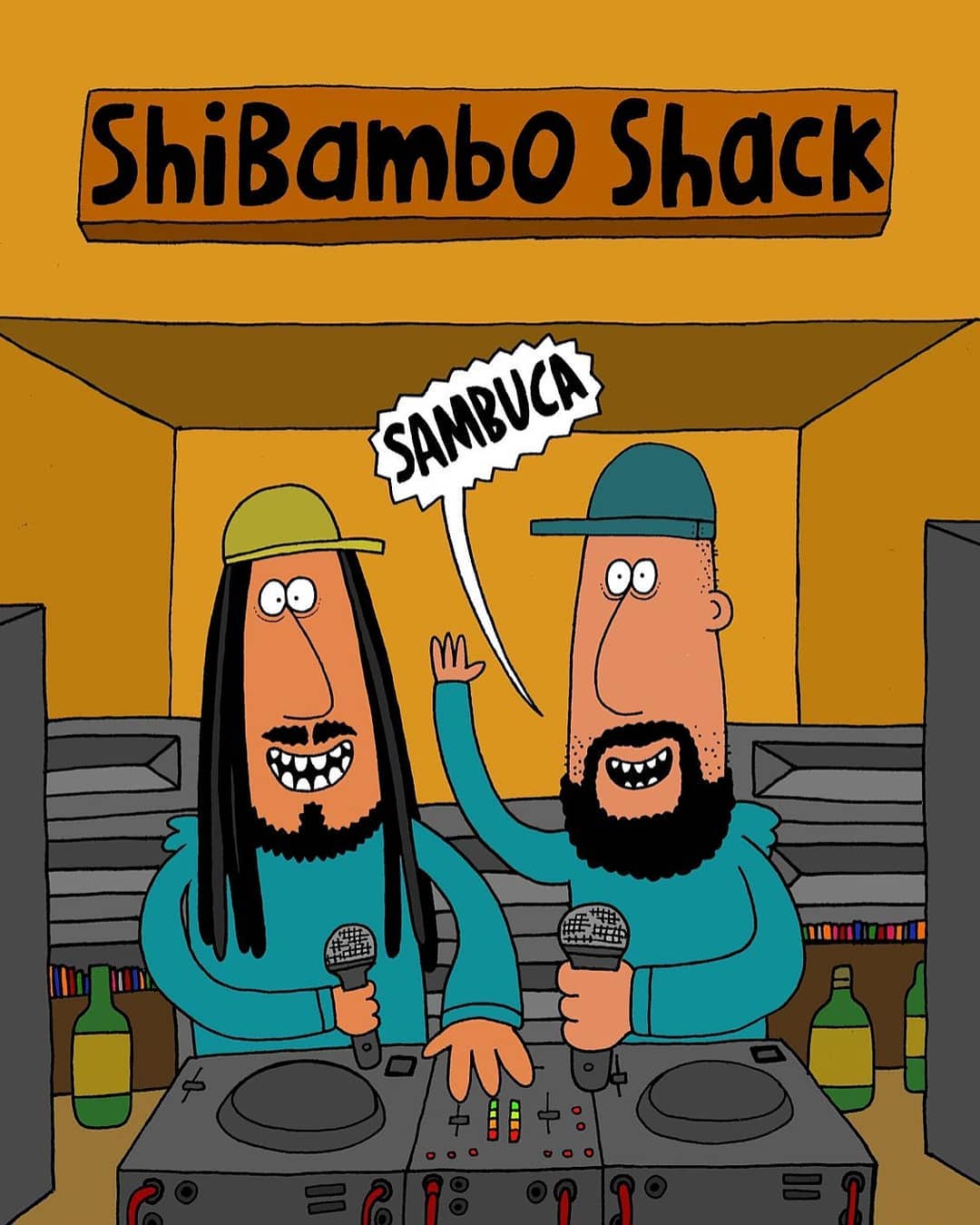
Are there any up-and-coming artists in particular you’re proud of helping bring through on the podcast?
Cuttah: We ended up helping Maes’ Jah, Jah Livin get on FatKidOnFire because Will from FKOF heard it on us. I’m pretty proud of that one because that’s a wicked tune. That was really early on as well, I think it was the fifth or sixth show. A lot of the American guys have really surprised us with the stuff they’re coming with. They’ve been making tunes for a few years, but we’re only hearing it now. Mythm for example, his stuff is absolutely crazy.
C-BO: People like him from our perspective, we connect with them online and have that overseas link, but over here, quite a lot of people don’t know who these guys are yet. It’s not like they haven’t had any blow up, it’s just they’re outside of the bubble. That’s something that we’re proud of with our guest mix series actually.
Was that primarily the reason you looked to start the guest mix series then?
C-BO: Well, SHIVERZ basically sent over a mix to us. It wasn’t even a question; he’d already made the mix without telling us! Since then, we’ve put one out every other week from the main podcast. We try and spread it around a bit, touching different countries and sounds. If we can help give a bigger platform to an up-and-coming artist whose essence is there, they’re just finishing refining themselves, we look to get them on.
And then after only a couple of series of the podcast, you were getting recognition from the scene by getting the award for best show at the DUPLOC awards. How was that being recognised by your peers?
Cuttah: Yeah, it was pretty cool because we were on the first awards as well which we were not really expecting as the show had only been going about five months. We got third then which was pretty mad. We didn’t even know the awards were really a thing, even though we of course knew the label and YouTube channel.
C-BO: It was a bit surreal seeing our name up there alongside people like J:Kenzo and Sicaria [Sound.] Seeing people who watch our show posting online asking others to vote for us was crazy, like these people don’t know us personally, but they watch the show and have got to know our personalities. Awards are always a little bit controversial, but we see them more as a celebration of the year and a chance to shout about certain people. We also did our own video for the YouTube channel where we just spoke honestly about who our favourites for the year were.
If we go back further than the show, what were your earliest dubstep memories?
Cuttah: I started pretty early on listening to the original guys like Skream, Hatcha and Benga on YouTube. I didn’t really get into events until about seven years later and that was more of the heavier side of dubstep as well, the likes of Funtcase and that kind of stuff. I went from there but going to Outlook in 2017 brought me back to more of the deeper side that we primarily focus on with the podcast now.
C-BO: The reason I recognised the Funtcase that Todd was playing at that party was because I went to uni in Bournemouth where Funtcase is from so I went to the Dubnium nights there. They were wicked nights; there was always so some of dubstep featured as well as jungle and drum and bass. Before then, I’d heard it for the first time in college when someone was playing a Hatcha mix on a CD in the art studio. I was also brought up around my dad who was a DJ in the 90s who played jungle and garage so that was my bread and butter growing up. When I went to uni, I went to see the likes of Congo Natty and Nicky Blackmarket, but it wasn’t long before I was hearing the likes of Goth Trad and Distance. I was like what is this music?! One of my course mates was from Croydon as well, so he was always telling me not to go into the drum and bass rooms and to check out the dubstep.
Cuttah: When you hear dubstep on a system for the first time, it really changes your whole outlook on the genre. For so long, I just listened to it in my room because I didn’t know many other people who listened to it.
That’s something that The Bug for example has always said. Bass music needs to be heard live where the sound doesn’t just have a sonic effect on the listener, but a physical one as well…
C-BO: 100% man. My dad’s from a Jamaican background so I grew up around that sound system culture. It’s just the norm to me, everyone had their own little system in their house. I always recognised that when I went around to friend’s, music was important, but sound is different. We’ve been getting lots of messages recently of people planning to go to their first dubstep nights, so if they’re enjoying it on the podcast, they’re going to love experiencing it live.
You guys are fans and appreciators of the music first and foremost. How is it now being embedded in a scene surrounded by heads you grew up idolising? For example, a few weeks ago, you were playing alongside Hatcha on his 24-hour stream…
Cuttah: Yeah, it’s pretty mad really. The funny thing with Hatch is he rings me up all the time about little things but always ends up telling me a story about what he’s doing, so it’s nice that he’s so humble with everything. I’ve been listening to him since I was in year 11 and now, he’s sending us music and getting us involved in events. At the start of Deep Tempo, we were absolute little fan boys to everyone!
C-BO: When we started out, we never thought everyone would be so welcoming. We don’t have any credibility prior to the show, we’re just two dudes interested in the music. When labels start sharing the exclusive tunes with us, you know there’s lots of trust there.
Dubstep is arguably the UK’s greatest underground export in terms of the global reach of the sound. How would you assess where the scene is now?
Cuttah: I feel there are essentially two different scenes at the moment. You’ve got your deep scene, which is what we cover, and then you have your more EDM scene. I actually don’t think people in the EDM scene really know who we are because we don’t tend to cover it. I think the dubstep stuff that we cover is in such a healthy place right now, as you have so many people bringing different elements to the table. You now even have Alix Perez and the drum and bass guys making their own style of dubstep. They’re really making it interesting and different. I’m really happy with it and I can’t wait to see what’s going to be happening in 2022.
C-BO: For me, the heavier stuff never really hit with me, I think because of my reggae/dub roots. We were always fully willing to feature it on the show as we’re open minded to the sound design talents of some of the producers in that scene. The dubstep scene is in an incredibly healthy place though, it’s so good. I love how varied it is at the moment, there is a thing for everyone in the scene. Some people still think dubstep is a bit of a dirty word, maybe because of the expansion of the sound into America, but for us it’s just so strong. Whether it’s in the UK, Europe, America, Japan or wherever else, there’s so much to pay attention to.
Cuttah: I love it. I haven’t been as excited with it all for years. In the last two years especially, you really feel like there’s something going on with the scene. There’s still a lot of people who don’t know what dubstep is, and if they do, they just think of Skrillex or the stuff you hear on Modern Warfare headshot compilations. By having the podcast, we can direct people to it so they can check out the sound that we push.
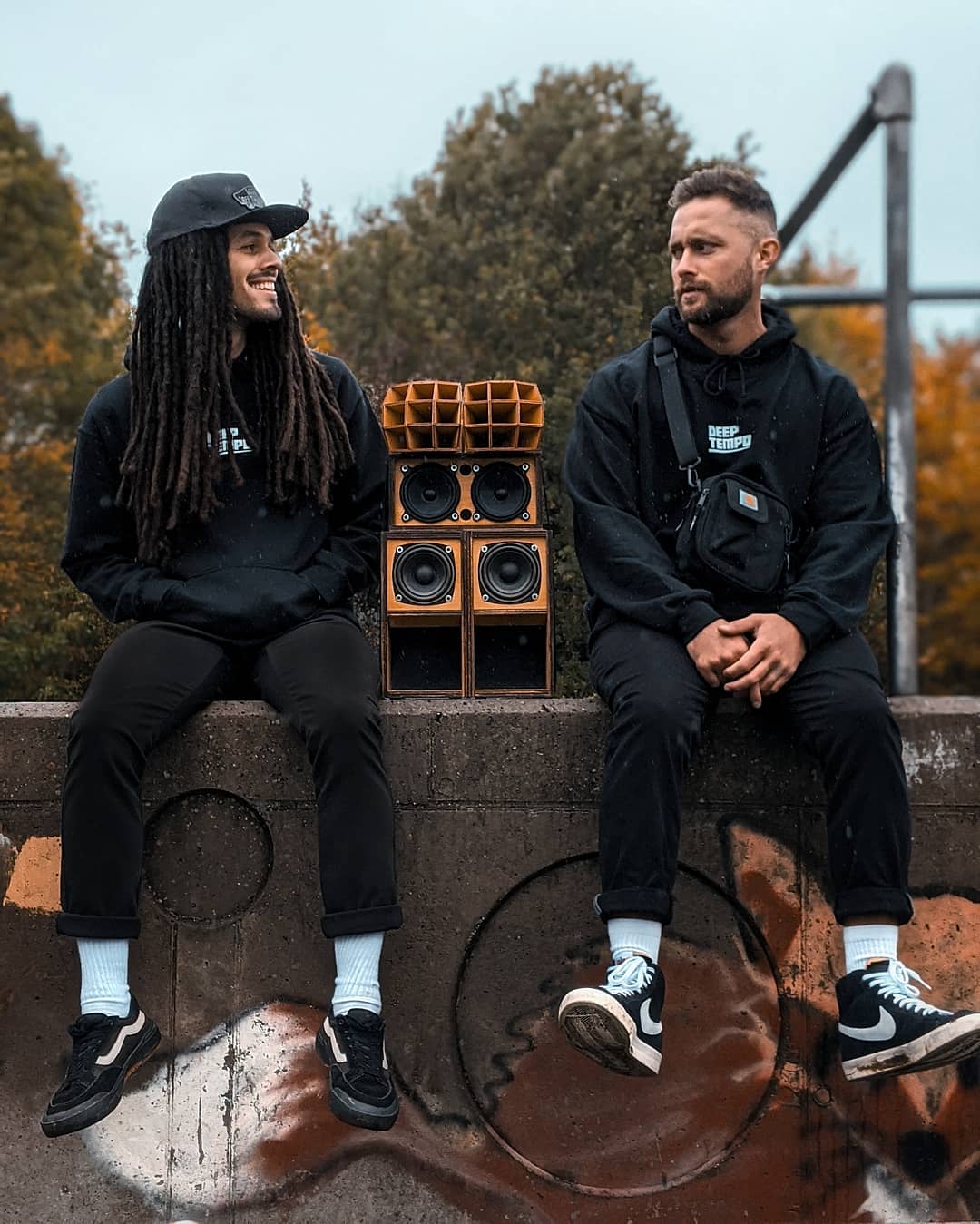
What do you guys have planned moving forward? I’ve seen you’ve got lots of events booked in for the remainder of the summer…
Cuttah: So, we’re doing an event at the Crow Pie pub in Rugby which we’re calling Crowchella. It’s just a little pub where it all started for us. They’ve came to us to do an event after a festival we were meant to do in Amsterdam got cancelled. It’ll be a mixed genre night and we’ve got Raze sound system coming down for it. After that we’ve in Brighton on September 4 and then we’re at Outlook festival for the week. We’ll come back, have a day off, and then we’re in Bristol for own event which is being headed up by ENiGMA Dubz b2b Biome. And then after that, we’re in Manchester for Hit&Run as well, before going to Leeds in October for SubDub on the Sinai system.
C-BO: We can’t talk about lineups, but we can say that we’ll be launching our own solo night in November which will be based in Birmingham. They’ll be bi-montly shows that will bring through everyone we’ve been gassing up on the show.
Can’t wait for them! To finish, what advice would you give to anyone wanting to start their own ‘grass roots’ podcast?
C-BO: I wrote about this recently when we announced our two-year as we have a lot of people reaching out to us about how to do a reactionary podcast. I always say just start with what you’ve got. You don’t need to go with fancy camera equipment, we just had a GoPro. Don’t buy fancy equipment if you don’t need it, always check your mixer to see if it has a USB port! Just enjoy the process as well. Don’t take it too seriously. I can’t actually watch our early shows because they’re so painful, but you have to go through that to grow. No one’s going to hate what you’re doing. At the end of the day, we’re just two regular dancefloor heads, so hopefully people can see that passion.
Cuttah: You have to be consistent as well. If we didn’t put out videos every other day and a podcast every two weeks, people wouldn’t react the way they do to our material.
C-BO: This is such a big one. There’s a lot of stuff that goes on in our personal lives, the same as everyone, but for two years, Todd and I showed up and got the show done. We feel like we owe it to the labels and artists because they share their music with us, and we want to help them. We love it anyway; it’s our social life, our switch-off from the world, our escape.
Cuttah: The best thing I can say, is just be yourself. I don’t think we were ourselves in the first one, but since then, that’s something I think we can say for sure. Do it for the love of the music, not because you want it to go somewhere. We don’t do it because we want to get to the bigger stage or anything, we do it because we love the sound, simple as that.
Follow Deep Tempo: YouTube / Soundcloud / Facebook / Instagram
